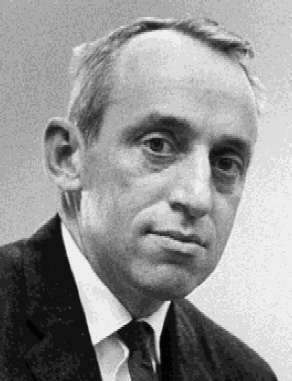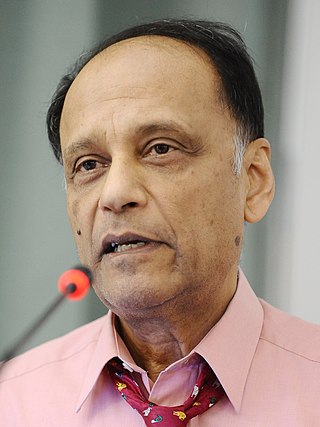Related Research Articles

James Tobin was an American economist who served on the Council of Economic Advisers and consulted with the Board of Governors of the Federal Reserve System, and taught at Harvard and Yale Universities. He contributed to the development of key ideas in the Keynesian economics of his generation and advocated government intervention in particular to stabilize output and avoid recessions. His academic work included pioneering contributions to the study of investment, monetary and fiscal policy and financial markets. He also proposed an econometric model for censored dependent variables, the well-known tobit model.
James Clement Dooge was an Irish Fine Gael politician, engineer, climatologist, hydrologist and academic who served as Minister for Foreign Affairs from 1981 to 1982, Leader of the Seanad and Leader of Fine Gael in the Seanad from 1982 to 1987 and Cathaoirleach of Seanad Éireann from 1973 to 1977. He served as a Senator from 1961 to 1977 and 1981 to 1987.

James Gardner March was an American political scientist, sociologist, and economist. A professor at Stanford University in the Stanford Graduate School of Business and Stanford Graduate School of Education, he is best known for his research on organizations, his seminal work on A Behavioral Theory of the Firm, and the organizational decision making model known as the Garbage Can Model.

Dennis Lynn Meadows is an American scientist and Emeritus Professor of Systems Management, and former director of the Institute for Policy and Social Science Research at the University of New Hampshire. He is President of the Laboratory for Interactive Learning and widely known as a coauthor of The Limits to Growth.

Sir Partha Sarathi Dasgupta is an Indian-British economist who is Frank Ramsey Professor Emeritus of Economics at the University of Cambridge, United Kingdom, and a fellow of St John's College, Cambridge.
Avner Greif is an economics professor at Stanford University, Stanford, California. He holds a chaired professorship as Bowman Family Professor in the Humanities and Sciences.
Tom R. Burns is an American/Swedish sociologist, professor emeritus of sociology at the University of Uppsala in Sweden and founder of the Uppsala Theory Circle.
Robert W. Kates was an American geographer and independent scholar in Trenton, Maine, and University Professor (Emeritus) at Brown University.
Michael Christopher Jackson OBE is a British systems scientist, consultant and Emeritus Professor of Management Systems and former Dean of Hull University Business School, known for his work in the field of systems thinking and management.

David W. Orr is the Paul Sears Distinguished Professor of Environmental Studies and Politics Emeritus at Oberlin College, and presently Professor of Practice at Arizona State University.

Sustainability is a social goal for people to co-exist on Earth over a long time. Specific definitions of this term are disputed and have varied with literature, context, and time. Experts often describe sustainability as having three dimensions : environmental, economic, and social, and many publications emphasize the environmental dimension. In everyday use, sustainability often focuses on countering major environmental problems, including climate change, loss of biodiversity, loss of ecosystem services, land degradation, and air and water pollution. The idea of sustainability can guide decisions at the global, national, and individual levels. A related concept is sustainable development, and the terms are often used to mean the same thing. UNESCO distinguishes the two like this: "Sustainability is often thought of as a long-term goal, while sustainable development refers to the many processes and pathways to achieve it."

Science Policy Research Unit (SPRU) is a research centre based at University of Sussex in Falmer, near Brighton, UK. It focuses on long term transformative change, science policy and innovation across different sectors, societies and structures. It was one of the first interdisciplinary research centres in the field of science and technology policy and at the forefront of the development of innovation as an academic discipline. Alongside internationally renowned research, SPRU also offers a range of MSc courses, as well as PhD research degrees.

Jørgen Randers is a Norwegian academic, professor emeritus of climate strategy at the BI Norwegian Business School, and practitioner in the field of future studies. His professional field encompasses model-based futures studies, scenario analysis, system dynamics, sustainability, climate, energy and ecological economics. He is also a full member of the Club of Rome, a company director, member of various not-for-profit boards, business consultant on global sustainability matters and author. His publications include the seminal work The Limits to Growth (co-author), and Reinventing Prosperity.
William P. Barnett is an American organizational theorist, and is the Thomas M. Siebel Professor of Business Leadership, Strategy, and Organizations at the Stanford Graduate School of Business. He is the BP Faculty Fellow in Global Management; Senior Fellow, Woods Institute for the Environment at Stanford; Director of the Center for Global Business and the Economy; Director of the Business Strategies for Environmental Sustainability Executive Program; and Codirector of the Executive Program in Strategy and Organization.
Tim O'Riordan OBE DL FBA is a British geographer who is Emeritus Professor of Environmental Sciences at the University of East Anglia (UEA) and a prominent British environmental writer and thinker.
Robert L. Stivers is an American theologian, environmentalist, and Professor Emeritus of Ethics at Pacific Lutheran University, Tacoma, Washington, known for his early works of environmental ethics and sustainable development. and as "long-time advocate of Presbyterian ecojustice concerns."
Dennis Clark Pirages is an American political scientist, environmentalist and former Harrison Professor of International Environmental Politics at the University of Maryland, College Park, known for his work on the environment and sustainability questions.

Jan Carel Zadoks is a Dutch botanist and a professor emeritus of ecological plant pathology at Wageningen University & Research.
James Patrick Manyenye Ntozi was an Ugandan retired academic and farmer. He worked as a researcher in demographics and statistics at Makerere University in Uganda, with his main research projects focusing on the HIV/AIDS epidemic in Africa, fertility, census-taking, and aging and the life cycle. A medical demographer and statistician by training, his areas of expertise include gauging needs assessment, conducting evaluations, and creating baseline studies. After retirement, he took up work as a farmer. In 2011, the book Demography of Uganda and Selected African Countries was published in honor of his research contributions. Professor Ntozi died on Wednesday 19 May 2021 in Kampala, Uganda.
References
- ↑ John Pezzey, "Sustainable development concepts." World 1.1 (1992): 45.
- ↑ Faber, Niels, René Jorna, and J. O. Van Engelen. "The Sustainability Of" Sustainability"—A Study Into The Conceptual Foundations Of The Notion Of" Sustainability"." Journal of Environmental Assessment Policy and Management 7.01 (2005): 1-33.
- ↑ Du Pisani, Jacobus A. "Sustainable development–historical roots of the concept." Environmental Sciences 3.2 (2006): 83-96.
- ↑ Patricia Spellman. A Guide to Graduate Study in Political Science. American Political Science Association, 1984. p. 122
- 1 2 Coomer (1979;255)
- ↑ Humanist Voices in Verse: James C. Coomer, at thehumanist.com. 7 December 2011; Accessed 20-05-2017.
- ↑ World Future Society. The Futures Research Directory: Individuals. 1987, p. 41
- ↑ James C. Coomer at smashwords.com. Accessed 20-05-2017.
- ↑ Quest for a Sustainable Society at sciencedirect.com, 2017.
- 1 2 Coomer (1981, 1)
- ↑ Dillard B. Tinsley (born 04.04.1938) is Emeritus Professor of Marketing at the Stephen F. Austin State University.
- 1 2 3 Dillard B. Tinsley. "Business Organizations in the Sustainable Society," in: J.C. Coomer (ed.), Quest for a Sustainable Society. 1979, pp. 164-182. p. 164